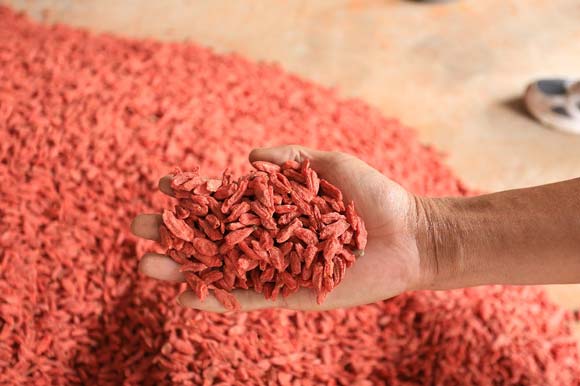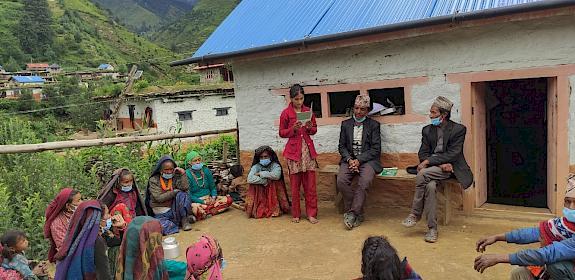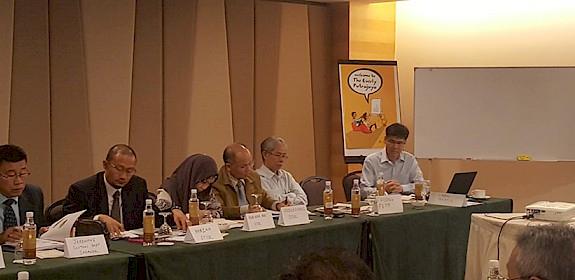TCM industry promotes sustainable sourcing of plant ingredients
Delingha, Qinghai, China, 15th September 2014—Representatives from the traditional Chinese medicine (TCM) sector met last month in Delingha to discuss latest developments in the industry and in particular focus on the sustainability of production of the Chinese Wolfberry Lycium barbarum.

Carried out under the project Engaging China’s private sector in sustainable management of medicinal plants—the multiplier effect (EGP-MAPs), the meeting aimed to promote the responsible and sustainable sourcing of medicinal plant ingredients.
Medicinal plant ingredients used by the TCM industry are both wild collected and cultivated, so although the EGP-MAPs project is primarily focused on wild-harvesting, it also promotes environmentally-friendly cultivation of medicinal plants through industry leadership in supply chain management.
The project is carrying out a feasibility study to identify and recommend the most appropriate sustainable cultivation certification schemes and standards and train farmers on best practices for environmentally-friendly cultivation.
More than 200 delegates in Delingha included representatives from the Chinese Academy of Sciences, International Co-operation Department of the State Traditional Chinese Medicine Administration (STCMA), government officials from Haixi State, Qinghai province, Haixi Agriculture and Husbandry Bureau and commercial retailers.
Speaking at the opening ceremony, Wu Zhendou, Vice-Director of STCMA, spoke about the importance attached to the TCM industry within China, particularly its role in helping foster international co-operation, and the increasing use of TCM in treating chronic diseases and infectious diseases, and the opportunity this presented for development of the Wolfberry industry in the Qaidam region.
Experts discussed the techniques used in the production of medicinal plant products, and a presentation by Li Chenyang, TRAFFIC’s Medicinal and Aromatic Plant Programme Manager, about use of the FairWild Standard for sustainable wild-harvesting of plants, in particular focusing on the EGP-MAPs project, was warmly received. Dr Guo Yuhai from the China Agriculture University Research Center was invited by TRAFFIC to the meeting and delivered a presentation on sustainable organic cultivation.
Following the meeting a field visit to Nuo Mu Hong Lycium barbarum Farm took place. The visit was organized by the EGP-MAPs project partners in conjunction with the larger TCM industry meeting initiated by the China Medical Pharmaceutical Materials Association (CMPMA), the World Federation of Chinese Medicine Societies (WFCMS) and the Qinghai Haixi Mongolia Tibetan Government, together with the International Trade Union of Genuine Regional Material Medical (TUGRMM) and TRAFFIC.
The 100 hectare farm includes areas with transplanted wild Black Chinese Wolfberry bushes, and some core areas where the Wolfberry is grown to meet EC and China Green Food standards.
Wolfberry Lycium barbarum is used in TCM for nourishing the liver, which in turn, improves the eyesight. Haixi State is second only to Ningxia in terms of the area producing Lycium barbarum in China and aims to standardize its production and processing procedures to achieve positive economic development and benefits for the local ecosystem.
Wolfberry from the Qaidam basin is highly rated because it is grown in a remote, rural location and produces plump fruit that has a high content of sugar and medicinally active compounds. Factors helped by the high altitude, with warm sunny days but cold overnight temperatures that reduce the incidences of pest and disease damage.
Some producers in the region have already achieved certifications by the US National Organic Programme or EC organic standards and as green products by the Ministry of Agriculture of China.
“TRAFFIC, as an organization helping to conserve wildlife resources, is pleased to see the active efforts being made by pharmaceutical companies to ensure their ingredients are produced in an environmentally-friendly manner aimed at achieving the highest international standards to improve the quality of their products, reduce pollution and protect medicinal plant species,” said Chenyang Li, TRAFFIC’s Medicinal and Aromatic Plant Programme Manager.
Mr Dai Dexiong, Vice General Manager of Zhejiang Wecome Co., Ltd added: “Lessons from seeing Lycium barbarum production in action will certainly help in the application of organic production methods for medicinal plants in Zhejiang and Hunan provinces thorough the EGP project.”
“Information about the domestic and global markets for organic products will help us to meet our international requirements for sustainability.”
 This communication has been produced with the financial assistance of the European Union. The contents of this communication are the sole responsibility of TRAFFIC and can under no circumstances be regarded as reflecting the position of the European Union.
This communication has been produced with the financial assistance of the European Union. The contents of this communication are the sole responsibility of TRAFFIC and can under no circumstances be regarded as reflecting the position of the European Union.



